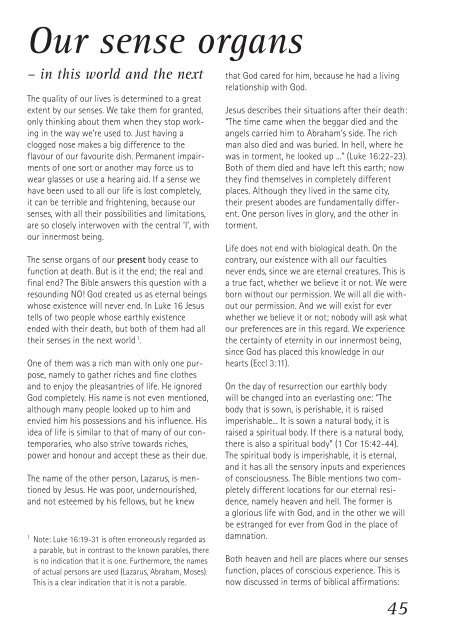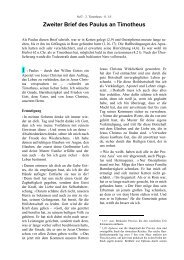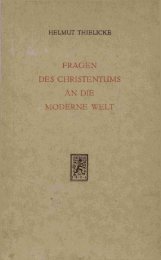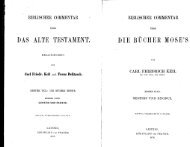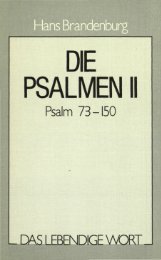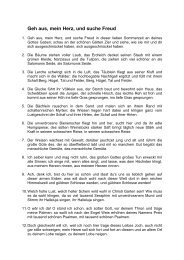You also want an ePaper? Increase the reach of your titles
YUMPU automatically turns print PDFs into web optimized ePapers that Google loves.
<strong>Our</strong> <strong>sense</strong> <strong>organs</strong><br />
– in this world and the next<br />
The quality of our lives is determined to a great<br />
extent by our <strong>sense</strong>s. We take them for granted,<br />
only thinking about them when they stop working<br />
in the way we’re used to. Just having a<br />
clogged nose makes a big difference to the<br />
flavour of our favourite dish. Permanent impairments<br />
of one sort or another may force us to<br />
wear glasses or use a hearing aid. If a <strong>sense</strong> we<br />
have been used to all our life is lost completely,<br />
it can be terrible and frightening, because our<br />
<strong>sense</strong>s, with all their possibilities and limitations,<br />
are so closely interwoven with the central ’I’, with<br />
our innermost being.<br />
The <strong>sense</strong> <strong>organs</strong> of our present body cease to<br />
function at death. But is it the end; the real and<br />
final end? The Bible answers this question with a<br />
resounding NO! God created us as eternal beings<br />
whose existence will never end. In Luke 16 Jesus<br />
tells of two people whose earthly existence<br />
ended with their death, but both of them had all<br />
their <strong>sense</strong>s in the next world 1 .<br />
One of them was a rich man with only one purpose,<br />
namely to gather riches and fine clothes<br />
and to enjoy the pleasantries of life. He ignored<br />
God completely. His name is not even mentioned,<br />
although many people looked up to him and<br />
envied him his possessions and his influence. His<br />
idea of life is similar to that of many of our contemporaries,<br />
who also strive towards riches,<br />
power and honour and accept these as their due.<br />
The name of the other person, Lazarus, is mentioned<br />
by Jesus. He was poor, undernourished,<br />
and not esteemed by his fellows, but he knew<br />
1 Note: Luke 16:19-31 is often erroneously regarded as<br />
a parable, but in contrast to the known parables, there<br />
is no indication that it is one. Furthermore, the names<br />
of actual persons are used (Lazarus, Abraham, Moses).<br />
This is a clear indication that it is not a parable.<br />
that God cared for him, because he had a living<br />
relationship with God.<br />
Jesus describes their situations after their death:<br />
“The time came when the beggar died and the<br />
angels carried him to Abraham’s side. The rich<br />
man also died and was buried. In hell, where he<br />
was in torment, he looked up ...” (Luke 16:22-23).<br />
Both of them died and have left this earth; now<br />
they find themselves in completely different<br />
places. Although they lived in the same city,<br />
their present abodes are fundamentally different.<br />
One person lives in glory, and the other in<br />
torment.<br />
Life does not end with biological death. On the<br />
contrary, our existence with all our faculties<br />
never ends, since we are eternal creatures. This is<br />
a true fact, whether we believe it or not. We were<br />
born without our permission. We will all die without<br />
our permission. And we will exist for ever<br />
whether we believe it or not; nobody will ask what<br />
our preferences are in this regard. We experience<br />
the certainty of eternity in our innermost being,<br />
since God has placed this knowledge in our<br />
hearts (Eccl 3:11).<br />
On the day of resurrection our earthly body<br />
will be changed into an everlasting one: “The<br />
body that is sown, is perishable, it is raised<br />
imperishable... It is sown a natural body, it is<br />
raised a spiritual body. If there is a natural body,<br />
there is also a spiritual body” (1 Cor 15:42-44).<br />
The spiritual body is imperishable, it is eternal,<br />
and it has all the sensory inputs and experiences<br />
of consciousness. The Bible mentions two completely<br />
different locations for our eternal residence,<br />
namely heaven and hell. The former is<br />
a glorious life with God, and in the other we will<br />
be estranged for ever from God in the place of<br />
damnation.<br />
Both heaven and hell are places where our <strong>sense</strong>s<br />
function, places of conscious experience. This is<br />
now discussed in terms of biblical affirmations:<br />
<strong>45</strong>


